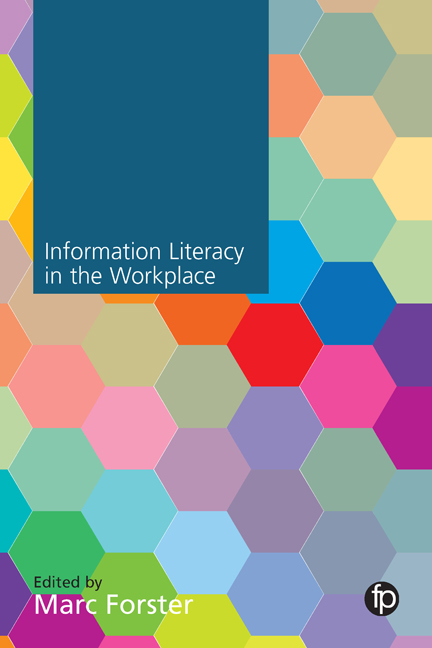Book contents
- Frontmatter
- Contents
- Figures and tables
- Contributors
- Foreword
- 1 Information Literacy and the workplace: new concepts, new perspectives?
- 2 How is Information Literacy experienced in the workplace?
- 3 Information Literacy and the personal dimension: team players, empowered clients and career development
- 4 From transaction to transformation: organizational learning and knowledge creation experience within Informed Systems
- 5 Virtuality at work: an enabler of professional Information Literacy
- 6 Determining the value of Information Literacy for employers
- 7 Information Literacy's role in workplace competence, ‘best practice’ and the ethics of professional obligation
- 8 Learning within for beyond: exploring a workplace Information Literacy design
- 9 Developing information professional competences in disciplinary domains: a challenge for higher education
- 10 The ‘hidden’ value of Information Literacy in the workplace context: how to unlock and create value
- 11 The ‘Workplace Experience Framework’ and evidence-based Information Literacy education
- References
- Index
1 - Information Literacy and the workplace: new concepts, new perspectives?
Published online by Cambridge University Press: 08 June 2018
- Frontmatter
- Contents
- Figures and tables
- Contributors
- Foreword
- 1 Information Literacy and the workplace: new concepts, new perspectives?
- 2 How is Information Literacy experienced in the workplace?
- 3 Information Literacy and the personal dimension: team players, empowered clients and career development
- 4 From transaction to transformation: organizational learning and knowledge creation experience within Informed Systems
- 5 Virtuality at work: an enabler of professional Information Literacy
- 6 Determining the value of Information Literacy for employers
- 7 Information Literacy's role in workplace competence, ‘best practice’ and the ethics of professional obligation
- 8 Learning within for beyond: exploring a workplace Information Literacy design
- 9 Developing information professional competences in disciplinary domains: a challenge for higher education
- 10 The ‘hidden’ value of Information Literacy in the workplace context: how to unlock and create value
- 11 The ‘Workplace Experience Framework’ and evidence-based Information Literacy education
- References
- Index
Summary
Introduction
As the focus of interest in Information Literacy (IL) continues to spread out from the university into the wider world, including the world of work, can we be confident that existing assumptions, definitions and methods of development continue to be relevant and appropriate? Both anecdotal and research evidence suggests not; that IL may not manifest as the same phenomenon in the workplace as it does in the academic environment. Young professionals, confronted by a way of dealing with information quite different to the academic, may be disorientated by the experience (Goldstein, 2014; Inskip, 2014; Williams, Cooper and Wavell, 2014; Osborn, 2011) and find themselves having to think about their relations to information in new ways: in terms of meaning, value, and purpose.
How is IL to be reconceptualized for the workplace? How should its parameters be redrawn so that librarians, academics, organizations and businesses can better understand workplace professionals and the students studying for those professions, and so effectively support them in efficient and creative engagement with the contemporary information landscape? How can IL be developed in a way that is meaningful and appropriate for them? Perhaps the question is one of evidence as much as conception. How can professions, many of which are especially focused on, and dependent on, information (Evetts, 2006) be supported in their information use if there is a lack of evidence as to how and why they use that information? Do we know in what ways information experiences in the workplace are significant to professionals themselves, their employers and educators and society at large? Indeed, what is the ‘workplace’ in an increasingly virtual information world?
Information Literacy's role and value in professional and workplace performance has been the subject of a number of recent research studies in the UK, Australia, Hong Kong and the USA. These studies have led to the development of new perspectives on workplace IL, including as a facilitator of effective and empowering inter-professional and professional–client relation - ships; as a component of the structure and dynamic of a ‘learning’ workplace, where decision making is therefore effective and creative; and as an ethical safeguard in the duty and responsibilities professionals have to clients, patients and employers to be fully informed when making vital decisions.
- Type
- Chapter
- Information
- Information Literacy in the Workplace , pp. 1 - 10Publisher: FacetPrint publication year: 2017
- 1
- Cited by

